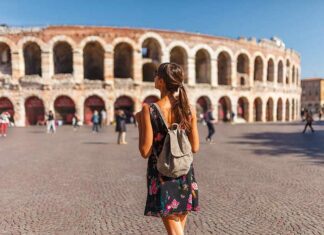Situated on the banks of the river Adige in the north-eastern Veneto region, Verona is Italy’s second most well-preserved Roman city after Rome. In fact, if you want to take a step back in time, all you have to do is get lost among the arches of the Arena, the Roman amphitheatre and temple of international opera, walk among the almost intact steps of the Roman Theatre, which is still used today for shows and performances, or walk on the Ponte Pietra, built by the Romans around the first century BC.
What makes this city – which was Roman, Gothic, Byzantine, Lombard, Scaligera, Visconti and finally Venetian – unique is the harmonious combination of all these dominations. Declared a World Heritage Site by UNESCO, the historic centre of Verona boasts countless monuments and attractions not to be missed, such as Juliet’s house, one of the most visited sites in Italy, and the medieval Piazza delle Erbe, the city’s “living room”, and then Castelvecchio, an imposing military fortification.
Verona is also the romantic city par excellence, where the timeless love story of Romeo and Juliet is set, where you can stroll through the streets of the centre in a charming atmosphere or where you can indulge in the best of local cuisine after attending an evening show at the Arena.
And if all these marvels are not enough for you, you should know that Verona is surrounded by territories of great cultural and gastronomic interest, such as Valpolicella, an area of hills covered with vineyards, where the famous Amarone wine is produced, and Lessinia, with its rich environmental and natural heritage. Finally, with regard to excellence linked to wine, Verona’s pride is its participation as the Italian representative in the international network “Great Wine Capitals”, which brings together 11 major cities and wine-growing regions around the world. And it will be Verona itself that will host the network’s great Annual Meeting in 2024 on the occasion of the “Best of Wine Tourism” award (www.greatwinecapitals.com).


